In the recent past, you almost certainly experienced at least one circumstance in which a portable power source would have been an asset. Even though specific generators are better suited for certain occupations than others, the vast majority of generators are versatile enough to be employed for various tasks.
It is also essential to point out that merely having a generator on hand can be comforting in and of itself. Power outages are not only possible but also often, typically resulting from particularly severe weather. If you have a generator, you won’t need to worry about being without power for a period that could last for hours or even days.
Buying guide for the best portable generators based on wattage:
- Best 2,000 Watt Generator
- Best 3,000 Watt Generator
- Best 4,000 Watt Generator
- Best 5,000 Watt Generator
- Best 10,000 Watt Generator
- Best 12,000 Watt Generator
How to Choose the Best Portable Generator?
Power
When looking for a generator, one of the most prevalent concerns is how much power you will require; consequently, you must consider how you will use your generator.
If you already have a strategy for using your generator, responding to this question should be simple. It is common practice to include wattage requirements in the product’s user handbook, where they are, therefore, accessible without any effort.
Suppose you intend to use your generator to power many appliances simultaneously. In that case, you should get a generator whose minimum wattage equals the sum of all those appliances’ wattages.
However, there are a few exceptions to this general rule of thumb. To get started, it is necessary to consider the increase in the wattage demand caused by appliances with motor drives. A surge in power consumption can be observed within the initial few seconds of use, which corresponds to the time when the motor starts to turn. Consequently, all generators advertise their surge power rating, the amount of power they can produce for an extremely brief period to start up equipment containing motors.
The second necessary caution is that you should not run your generator at or very close to its maximum power for an extended period. Instead, after you have totaled the running wattages of everything you intend to plug in, check to ensure there is some wiggle space left over in the power provided by the generator.
The critical concern is the potential for dramatically increased engine wear brought on by ongoing generator usage at power levels very close to its total capacity. If you operate your generator to its utmost limit, you will notice an increase in the amount of noise it produces and the rate at which it uses fuel.
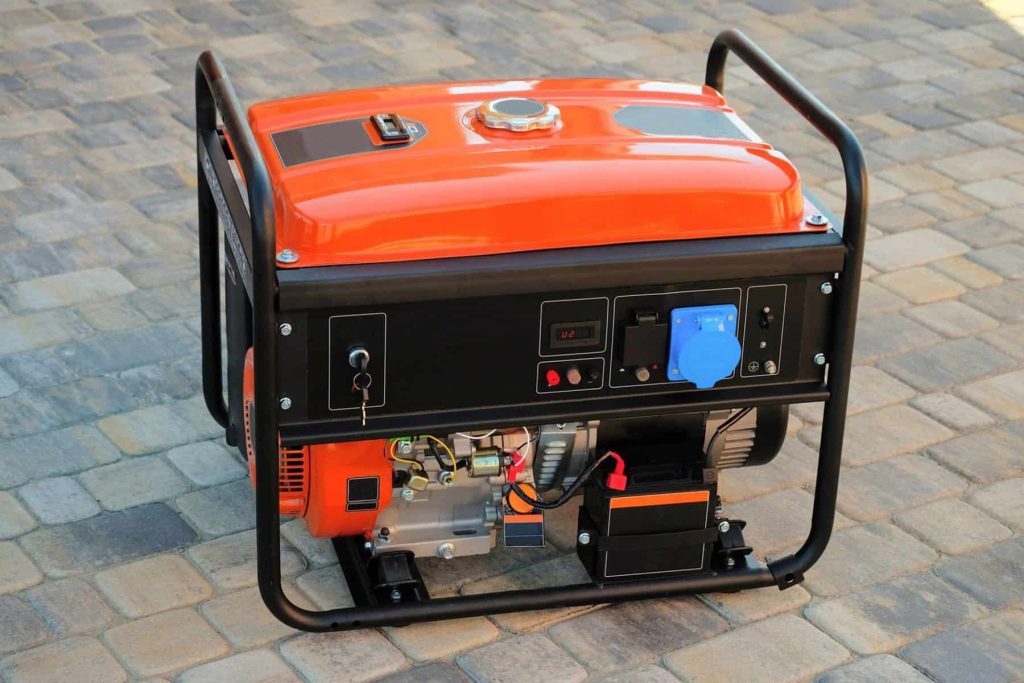
Estimating Wattage Requirements
You don’t need to worry if you want to put your generator to more than one use, don’t yet have all the appliances you’ll need to run them, or need to figure out what those uses are. You can use your generator for all of these things. There are a few different approaches one can take to ascertain the necessary size of the generator.
A wide variety of wattage calculator tools can be found on the internet. This software can assist you in determining the amount of power required from a generator when it is used in a recreational vehicle or at home.
A generator with 2,000 watts of electricity is sufficient for most home and outdoor activities, such as providing power to portable electronics while camping or working in the field.
When the electricity goes out, a generator with 3,000 to 4,000 watts can keep your home’s vital gadgets and appliances running. A recreational vehicle might also have a tiny air conditioner powered by it and the cooling it provides.
Larger generators, some of which can reach over 10,000 watts of electricity, are generally reserved for major construction sites, enormous recreational vehicles, or to power your property without any issues during a power outage that lasts for an extended period.
Conventional vs. Inverter Generators
Suppose you need a generator with an output of 4,000 watts or less. In that case, you will need to conduct some studies to choose between a conventional portable generator and a solar panel generator.
While your parents were still young, conventional portable generators were the standard in the industry. They are helpful and dependable, but numerous complaints about their noise have arisen. They must be compatible with the microprocessor-controlled appliances, equipment, and electronics available today.
If you utilize a generator with an inverter, you won’t need to worry about damaging your smartphone or computer. The level of “cleanliness” of the power produced by conventional and inverter generators is the critical factor that differentiates the two types of generators.
The engine supplies either alternating current or direct current (DC) generators with their power. Before releasing the power, inverter generators change the incoming alternating current (AC) to direct current (DC). This approach can bring the total harmonic distortion values to three percent or less, and electrical waves can be toned out.
The ability of inverter generators to portable power electronics is just one of several advantages offered by these machines.
The primary benefit is that, compared to regular generators, they produce significantly less noise. If you are standing over a conventional generator, you will need to raise your voice to be heard, but if you are using an inverter generator, you will not need to. Because of this, every single one of the quietest generators we checked out was an inverter model.
The second advantage is that, compared to their conventional counterparts, inverter generators are often more portable due to their reduced size and weight. While carrying your inverter generator, you won’t need to be concerned about accidentally burning yourself on a hot engine part because the engine is enclosed.
Last but not least, a parallel connection between numerous inverter generators is possible. This indicates that two of the same models can be connected to a single plug to maximize the power supply.
Inverter generators, on the other hand, use far less gas than their conventionally designed equivalents. Why, since inverter generators are superior to standard generators in so many different ways, aren’t inverter generators the default option everywhere?
Inverter generators, as you may expect to pay more for, are more expensive. Because there are so many electrical components close to the engine, repairing an inverter generator will be more costly than repairing a standard generator. Even though the prices aren’t outrageous, you should consider this.
The second factor to take into account is power. The most powerful inverter generators on the market today typically have surge power of approximately 4,000 watts. Consequently, if you demand more power than most people, you will need to either utilize numerous inverter generators in conjunction with one another or switch to a conventional generator.
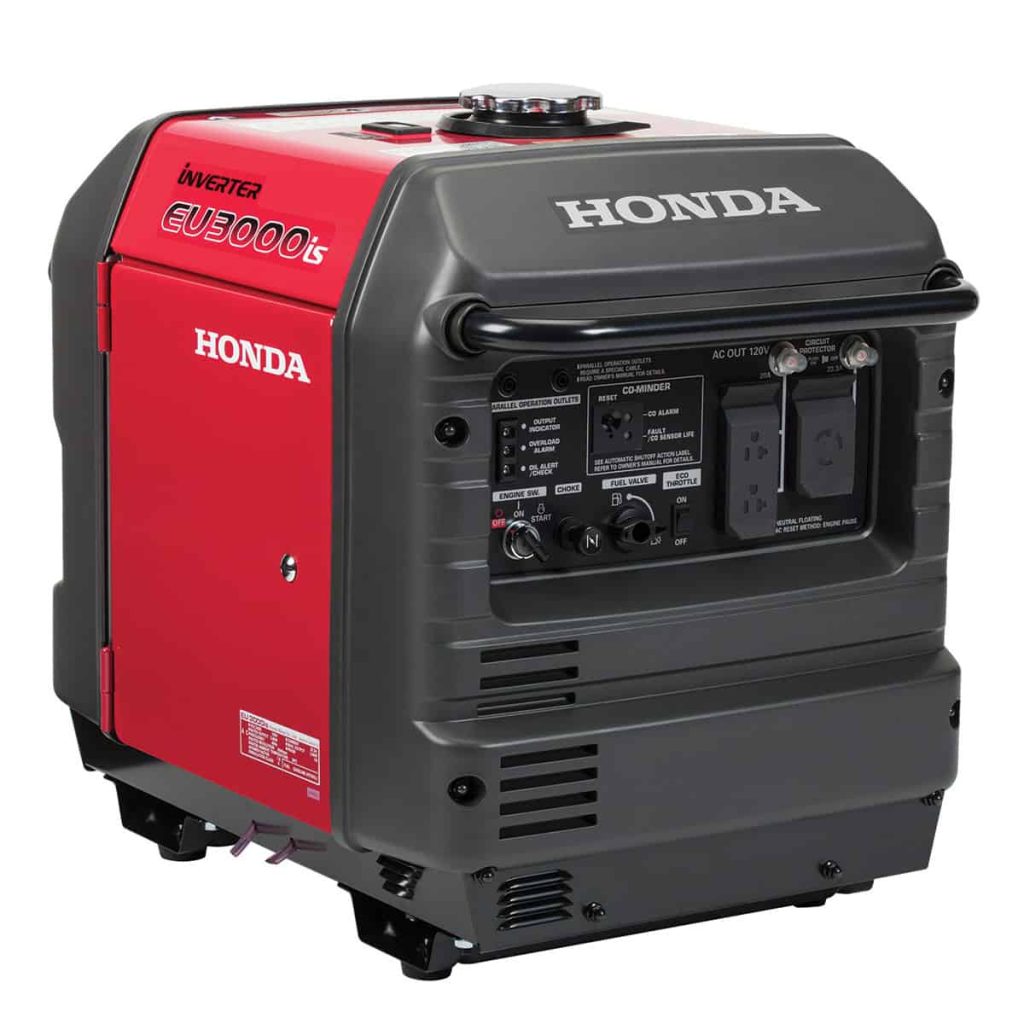
Which Fuel is the Most Optimal?
Although gasoline is the most common option for refueling a generator, you are not restricted to only that medium. The kind of work you plan to do with your generator and the types of fuels that are easily accessible will determine which type of fuel is most suitable for it.
The conventional gasoline generator has mainly been superseded in recent years by the more versatile dual-fuel generator. Most of these generators are dual-fuel, which means they can switch between gasoline and propane without needing to turn off the engine.
Propane can be stored for a more extended period compared to gasoline, sometimes even for years. Because of this, it is an excellent location to stockpile gasoline if you are preparing for an extended power outage at your residence. When you have us on your side, there is no reason to make educated guesses about the amount of propane your generator will require.
Dual fuel generators have relatively few downsides, the most significant being the increased initial purchase price. Propane is less expensive than gasoline. Therefore it may be more cost-effective to purchase a generator that can run on both fuels simultaneously.
With the addition of natural gas, tri-fuel generators elevate fuel flexibility to an entirely new level. Because natural gas is the fuel option with the lowest efficiency, running your generator on natural gas will result in the most significant reduction in the amount of electricity it produces.
But, if you have a natural gas line running into your home, you can continue using your generator even if the power is out for an extended period. This is because gas lines can continue to function even when the power is out, provided there is no damage to the underground lines.
In the end, diesel generators are reliable for many years and thousands of hours of operation, with only periodic service required. Diesel generators are less common than gasoline generators because diesel generators are both noisier and more expensive than gasoline generators.
How Noisy Are Portable Generators?
Even though generators have traditionally had a negative image for being noisy, newer generators that utilize inverter technology are attempting to change that perception.
When operating at 25% load, most inverter generators in the 2,000-3,000 watt range create a noise level of roughly 50 dB. This is approximately comparable to the decibel level of an average discussion.
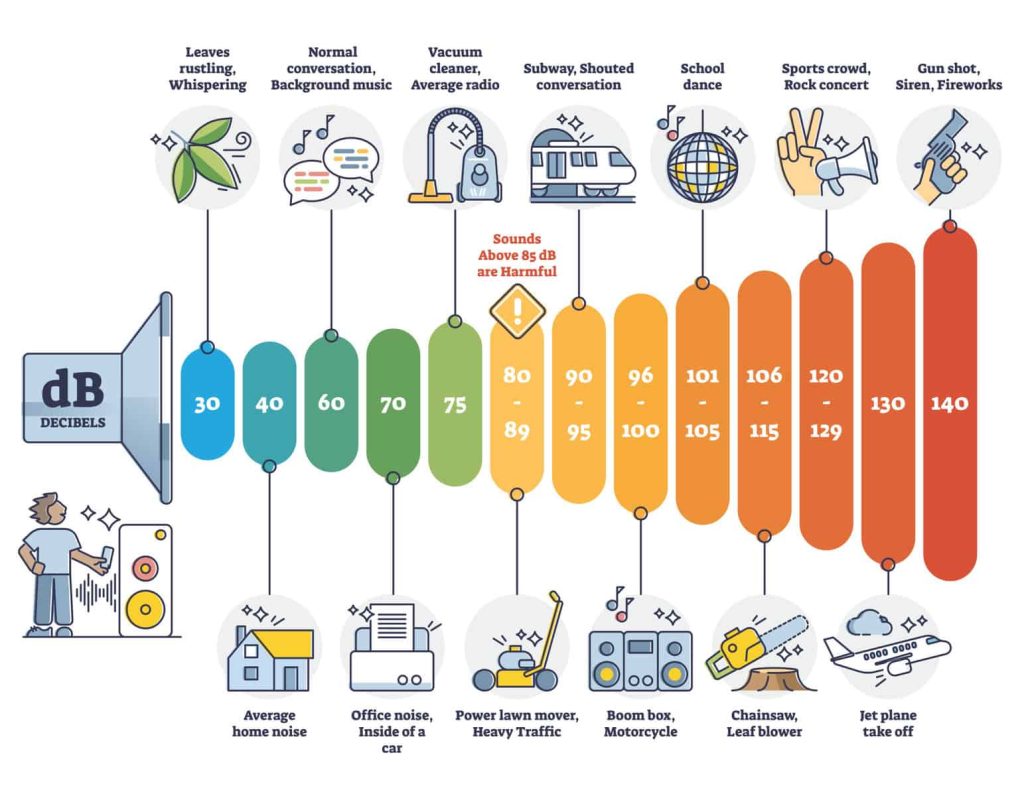
It would be best if you were aware that the generator’s noise would get louder as you get closer to the point where it is producing its maximum power. You need to keep this in mind as you move closer to this point. Although most inverter generators begin operating at approximately 50 decibels (dB) when operating at total capacity, they can reach up to 60 dB, which is roughly the same amount of noise as a moving car. When operating at total capacity, inverter generators produce approximately the same amount of noise.
As their noise levels can reach up to 70 decibels, you should exercise extreme caution if you intend to use a standard generator or a much bigger generator at night or in a campground because their noise levels can get that high.
Electric and Remote Starting
A convenient electric start activated by pushing a button is becoming standard for today’s generators. This is intended to serve in place of the more conventional pull-cord start, which requires much physical effort to engage.
Also, some manufacturers have increased this convenience by making a remote start option available. To turn on your generator, you won’t need to go outside your home, RV, or tent at any point.
It is essential to keep in mind that electrical and remote-start generators necessitate the use of an onboard battery. A pull-cord starter is typically included as an additional safety feature on electric generators. The battery will eventually die if it is not regularly charged.
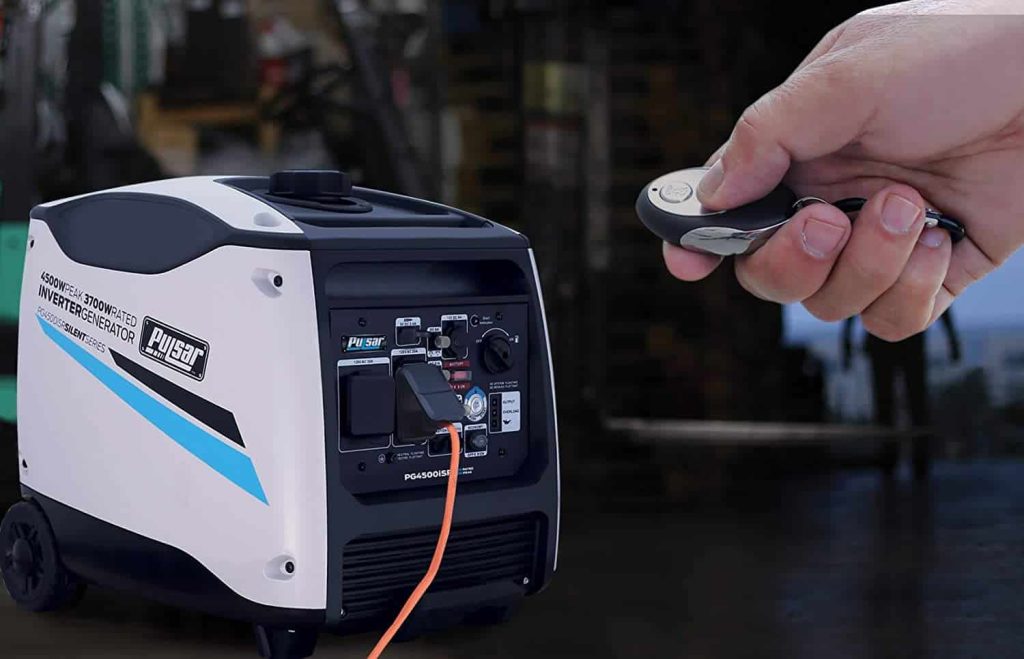
CARB Certification
When looking for a generator, there is one additional factor to consider: whether or not the Air Resources Board of the state of California has granted permission for its usage there (CARB).
Since the criteria established by CARB are stricter than those set by the EPA, generators do not necessarily need to have the CARB seal of approval to be sold.
It is permissible to sell any California generator given the go-ahead from the California Air Resources Board (CARB).
You should check with the California Air Resources Board to verify if a product has been approved for sale, even if you don’t live in the state of California (CARB). The fact that CARB has approved the generator in question suggests that it burns fuel more efficiently than similar generators without a license.
Top Generator Brands
- Honda Generators
- Predator Generators
- Generac Generators
- Champion Generators
- Duromax Generators
- Westinghouse Generators
How Should Parallel Connections Be Made Between Generators?
When numerous identical inverter generators are connected in parallel, the total power drawn from a single outlet can be increased.
The manufacturer of your inverter generators should be able to provide you with a parallel connection kit for purchase. Because of the general computers contained within inverter generators, you must use a parallel connection kit produced by the same manufacturer to connect two generators the same company produced.
Everything you need to connect two generators in parallel to the main outlet panel is included in the package. After the generators have been secured, plug your heavy appliance into either and turn them on.
What You Need to Know About Hooking Up an RV Generator?
If your generator comes equipped with a 30-amp RV-ready socket, it couldn’t be easier to connect it to your recreational vehicle. These three-pronged outlets are designed to connect to the 30-amp inlet in most recreational vehicles so that you can use a transfer cord of any brand.
If, on the other hand, your generator has a 120-volt/240-volt twist-lock connector rather than an RV-ready port, you will need a unique converter or transfer cable to use it with your RV.
Only a generator compatible with one of these can be used with the 30-amp input that your RV has. All the 120-volt plugs on your generator need to be hardwired directly into the home appliances inside your RV.
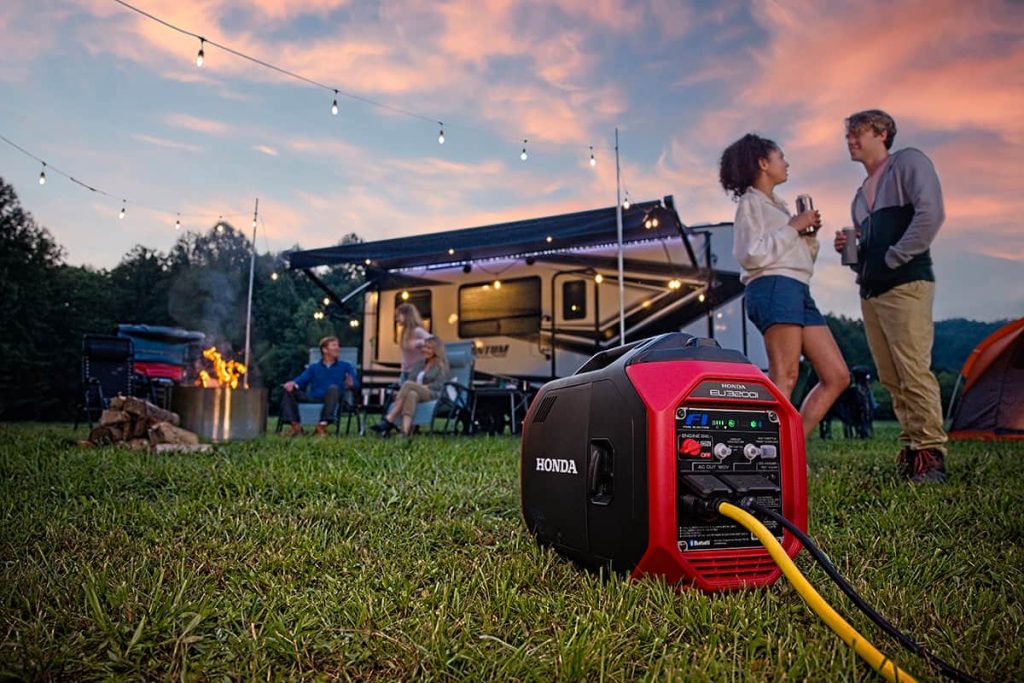
Maintaining Your Generator
A generator can provide reliable service for many years if properly maintained. The most crucial preventative precaution you can take for your generator is to change the oil regularly. A change of the engine oil in a generator is required after the first 30 hours of use, and after that, it is recommended to be done every 100 hours.
There should never be any stale gas in the tank at any time. The quality of gasoline degrades after it has been exposed to air for some time, and putting old fuel in your vehicle’s engine is a definite method to destroy it.
Before putting your generator away for the winter or for an extended amount of time, you should always check to ensure that the carburetor is fully dry. You might be able to use a feature that is built into the generator, or you might have to run the generator until the fuel runs out. It all depends on the model.
It is essential to run generators about once every month or so to keep the moving elements of the generator’s engine greased. When utilizing your generator, there are a few more things that you should keep in mind.
Always wait until the generator has completely cooled down before recharging it since this will ensure that the fuel is distributed evenly. When gasoline is added to a generator that is already hot, the operator and the generator are in grave danger of an explosion.
Second, making regular use of the power provided by your generator or operating it without fuel can help preserve the motor. Make sure you know the wattage requirements of the gadgets you wish to power with the generator and plug in the ones with the largest surge requirements first.
Finally, if you use a generator with an electric starter, ensure the battery is always fully charged. If this does not work, the pull-cord starter on the generator will need to be used.
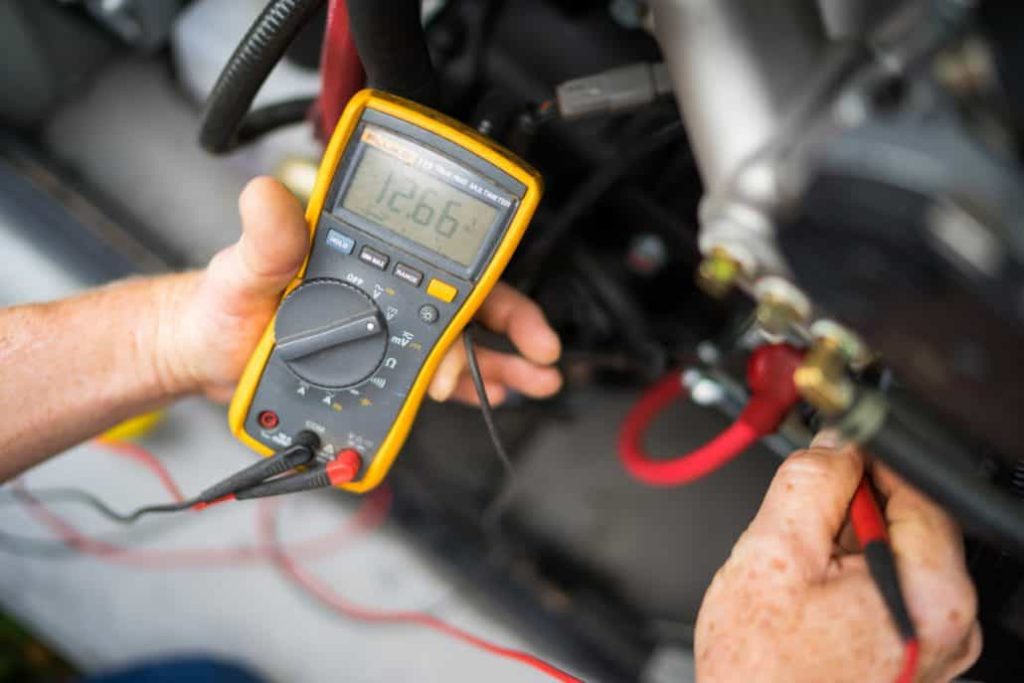
Frequently Asked Questions
If the generator is overworked, what will happen?
If there is not a voltmeter fitted, there is a chance that the generator will become overloaded. Depending on how your generator was constructed, the engine may turn off by itself, or a circuit breaker may trip, which would cause the generator to stop working.
If your generator has circuit breakers, you may need to utilize the controls on the outlet panel to reset them before the electricity can be restored. If some outlets do not have reset buttons and there is no primary breaker switch, it is required to turn off the generator’s engine to reset the system.
What are the Setup Instructions for a Home Generator?
The easiest way to solve this problem is to connect a portable generator to your home’s electrical systems by using extension cables. Even though this is a speedy, low-cost, and simple solution, it may still be irritating if the power outage is lengthy or occurs frequently.
A transfer switch is essential to connect a generator to the mains electrical supply and power a residence. Be prepared to pay some money if you want to wire one of them into an existing circuit breaker because you may need the assistance of a qualified electrician.
If you already have a transfer switch installed, you can connect the outlet that can handle 120 or 240 volts on your generator directly to it. To use a generator, you must first turn on your generator, then switch the transfer switch from the “line” position to the “generator” position. Finally, you must turn on each circuit you want before using the generator.
To what extent can one expect a generator’s fuel supply to last?
The amount of time a generator can run is dependent on the capacity of its fuel tank as well as the efficiency of its engine. This amount of time can vary significantly between different models. The predicted operating periods of generators often range from a few hours to 15 hours or more, with most estimations being based on a power load of between 25% and 50%.
If you expect to use your generator for an extended time, the runtime it provides will be an essential consideration in your decision. Keep in mind that the runtime of the generator will change depending on how closely you run it to its rated power output. This is an essential fact to keep in mind.
How can I determine the type of oil used in my generator?
As part of the preventative maintenance that should be performed on your generator, the oil should be changed every 100 hours. Most generators use synthetic oils with a viscosity that falls between 5W-30 and 10W-30. However, before you proceed with anything, you should first research what your generator manufacturer recommends doing.

Is there a guarantee for backup generators?
Most generators will come with some guarantee from the firm that manufactured them. However, this is not always the case. Before you buy a generator, it is essential to read over the warranty policy first, as it may cover only a single year, three years, or even longer. To add insult to injury, nearly every warranty policy is “limited,” which means that it may not pay for all types of damage to your generator. This is yet another reason to avoid purchasing a warranty.
Conclusion
Your requirements and objectives must direct you toward the most suitable generator choice. Create a list of the electronic devices and the amount of power each requires so that you may refer to them if there is a power outage or another emergency. Investing in a higher output generator will need you to spend more money. The price will also be impacted by the kind of electricity utilized, the manufacturer, and any additional features included. You are not left to examine these challenges by yourself in complete isolation. On our site, you can find solutions to any questions. Everyone can use this perfect buying guide when purchasing the best Portable Generator.
